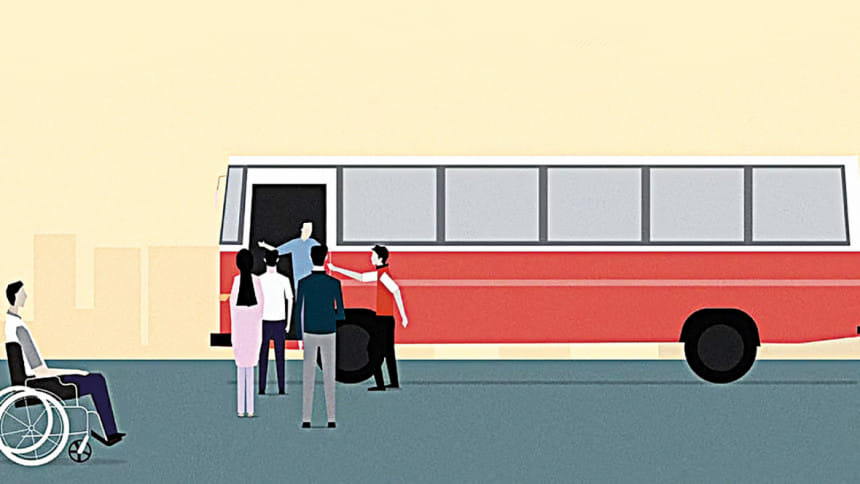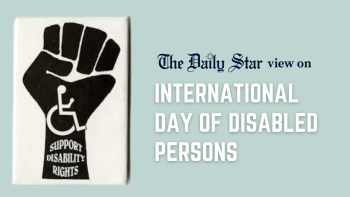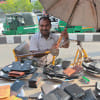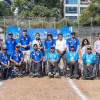People with disabilities have been reduced to numbers and statistics

Living with dignity as a visually impaired woman in Dhaka feels impossible when we are unable to trust our fellow citizens. Our state has ratified several policies and guidelines that are meant to protect people, and especially women and children with disabilities, but we continue to face significant structural barriers and discriminatory attitudes which keep us in a cycle of marginalisation and exclusion. I have been noticing that, in the push for inclusion, those of us with disabilities have been reduced to numbers and statistics, often packaged as a "good business case" so that organisations will take notice of us. While all that is practical, it is also important that our humanity and our unique struggles are not ignored. People with disabilities are citizens of this country and our rights must be realised. In order to illustrate what it is like to live with a disability in Bangladesh, I'd like to share a few personal stories.
Most public spaces and buildings in the country are not equipped to accommodate individuals with disabilities. For example, due to a lack of accessible toilets, there are students with disabilities who don't go to the bathroom for the entire day at schools and universities. One can guess the health consequences of not using a toilet for around five to seven hours daily. Infrastructural barriers such as poor transportation systems and inaccessible roads further restrict our mobility and make us dependent on those around us. Imagine the daunting task of crossing a bustling road in Dhaka as a visually impaired person; not to mention facing the chaos of honking horns, revving engines, and hurried footsteps. People bump into you and yell expletives. Every step forward feels risky and uncertain. Recently, a friend of mine, who is also visually impaired, was attempting to cross a street. Feeling frightened and confused, she asked strangers around her for help. A man offered to help her across, took her arm quite aggressively, and essentially pulled her to the other side. All the while, my friend was extremely aware that he was grazing her breast. But with all the sounds and uncertainty of what and who was around her, she kept quiet and even had to thank the man once on the other side.
In addition to the physical barriers, we face attitudinal barriers on a daily basis; snide remarks, pitying comments, judgement, forms of ridicule. Once, a colleague of mine with a physical disability was pregnant and visited the hospital for consultation. She was excited at the prospect of bringing new life into the world and becoming a mother. But instead of giving her the necessary information and support, the doctor asked her, "Apnar ei vulnerable obosthai baccha neyar ki dorkar chhilo?" ("Why did you decide to conceive in your vulnerable condition?") The doctor questioned her choice to get pregnant because she is visually impaired. This is a common experience for women with disabilities, who often find their personal choices and legal rights challenged, denying them the same opportunities as able people in terms of family life.
Furthermore, there is a glaring gap in the country's legal framework when it comes to addressing the specific needs and rights of women with disabilities. A recent case I came to know about shook me to my core. A young woman with visual, hearing, and speech impairment was raped by a neighbour in her own home. This incident haunts me because, if a similar attack happened to me, I could at least scream for help or report the crime. In the young survivor's case, her family seemed aware of what had happened but felt helpless about taking any actions because the woman was unable to describe anything about her rapist. There was no justice for her and the perpetrator roams free.
The intention behind sharing these stories is not to attract further pity but to demonstrate the vulnerable position Bangladeshis with disabilities are forced into because of the actions of our fellow citizens. It is crucial for the government, civil society organisations, as well as ordinary people, our friends, neighbours, and colleagues to address these systemic barriers and stigma. We demand efforts to raise awareness, improve accessibility, and promote inclusive policies and practices so that we are empowered to participate equally in society.
Nahian Bushra is a visually impaired singer, artist, and disability rights activist. She currently works at Physically Challenged Development foundation (PDF) to support students with disabilities.
Shaveena Anam works at The Daily Star.
Views expressed in this article are the author's own.
Follow The Daily Star Opinion on Facebook for the latest opinions, commentaries and analyses by experts and professionals. To contribute your article or letter to The Daily Star Opinion, see our guidelines for submission.


 For all latest news, follow The Daily Star's Google News channel.
For all latest news, follow The Daily Star's Google News channel. 








Comments